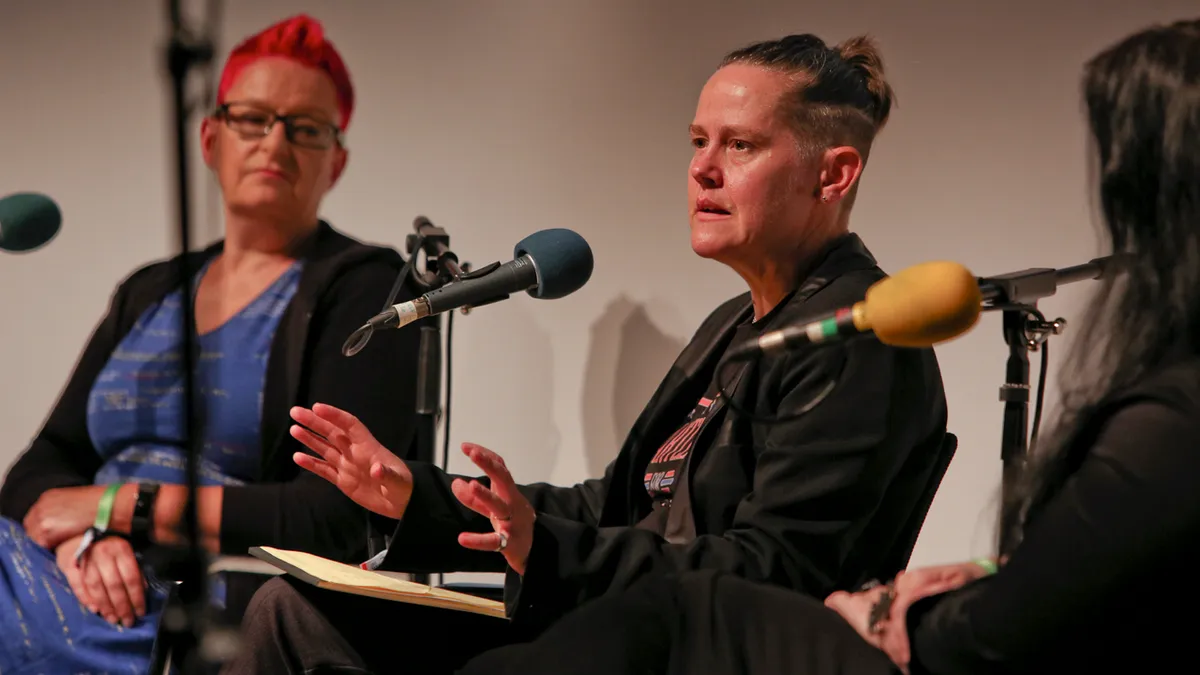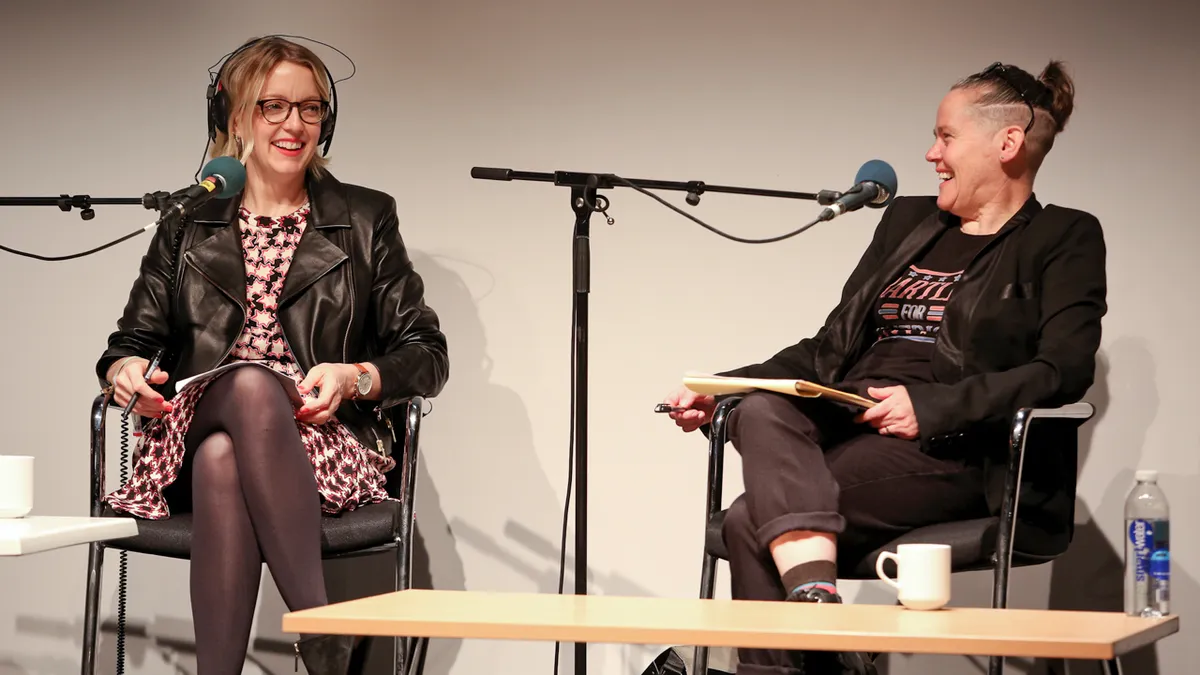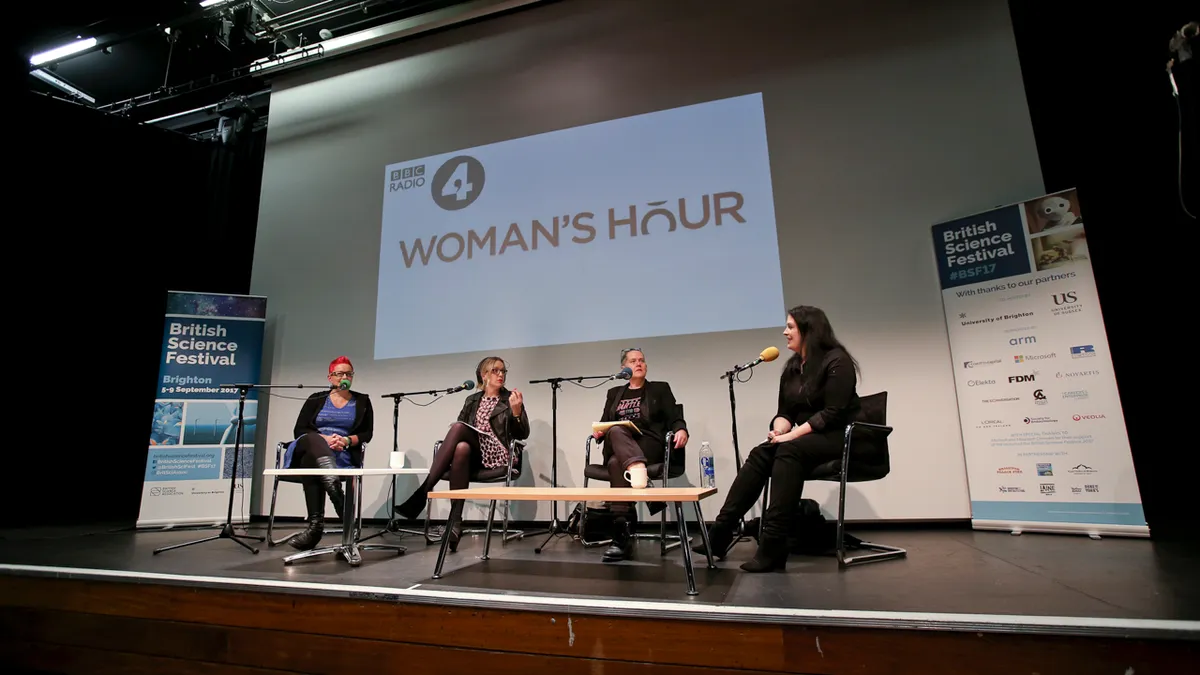Although in 2016 the number of women working in STEM increased by 13,000, the overall proportion actually decreased toonly 21 per cent. So why are such a large proportion of the female population eschewing careers in science and technology? At this year’s British Science Festival Lauren Laverne hosted a panel of experts for BBC Radio 4’s Late Night Woman’s Hour about the challenges and opportunities currently facing women working in technology. Sarah Kember, Professor of New Technologies of Communication at Goldsmiths University, was on that panel, so we asked her about sexism in tech, combating discrimination and whether the drive to get more women in STEM is worth all the effort.
Is the effort getting more women in STEM worth it?
Yes of course it is, and I’m not sure the effort is enough. I’ve been reviewing the material about how girls do compared to boys in early education and it’s after that the disparities start to open up, and we need to do considerably more to deal with intractable stereotypes; girls are good at this, boys are good at that. It has led to a sort of hardened gendering of subjects.
But I think to get more girls and women into STEM inclusion needs to be more intersectional, not only recognising the problems at the level of gender, but also in terms of race, where the numbers are catastrophic, sexuality and class. For me that remains really important, but it's not going to change the status quo by itself. It puts too much pressure on the few individuals that do make it through, who have to do their jobs twice as well but also change everything infrastructurally while they are there. That’s just a big ask, it's too much and just not happening. But it’s still the only place to start and we just can't accept the figures.
I just want to add that that the figures are a bad read for women at places like Google as well, but they are not unique to STEM. I teach media and communications, so I work in the arts, humanities and social sciences, and we have issues too, though they are not as stark. One of the issues we're concerned with is the lack of diversity in film and media, where the top films are only 15 per cent written and 5 per cent directed by women.

Is there a cultural problem encouraging women into STEM?
It is broader as a problem and it is one that is hardening for a reason I call scientism; we’re seeing socio-biology and biological essentialism again. It’s what we get from James Damore’sGoogle memo, which said that men are inherently better at computing and women inherently better at communication – that’s biological essentialism on the rise. I’m also seeing physiognomy and phrenology because of facial recognition software. I did some work on an algorithm for gender recognition which exists because it's easier to visually identify and thereby reinforce biological differences rather than trying to pick out a terrorist from a crowd, but the recent claims about face recognition being able to pick out an essentially feminine face and thereforeidentify gays, for me, fits within pseudoscience from the 19th Century.
What scientism is doing at the moment and how it’s getting such a high profile fits within a wider cultural politics. That’s the area that I work on the most as an academic in the field of feminism, science and technology studies. There is a lingering culture of post feminism saying 'feminism has done its job, we've sorted it out, job done', but I think it is harder to maintain that post-feminist line now with these gender pay gaps. There are other approaches within feminism that recognise that part of what’s happened is not so much a backlash, but the sense that there is a price to pay for the gains that we make, and continue to make, and it's there in the sense of an increasingly visible and tangible pressure on women, especially young women, to have it all, to be it all and work hard, play hard and measure up in all the metrics. Obviously in the case of working in STEM subjects to do it all for less reward as well.
I think a key issue though is this notion that seems to be coming throughGamergate, which is that diversity measures discriminate against presumably young, white, heterosexual men. We need to recognise that when we talk about these statistics and problems around inclusion in STEM, you can't isolate them from the wider political issues, which is not just tying Gamergate to the alt right for example, but also to a culture that is persistently sexist.
It's not just persistently sexist but regressively sexist, it's actually taking us back to an ideology and iconography of the 1950s in the worlds that I work in. For example I’m looking at the smart home environment, and smart kitchens and who's in them, and the broaderback-in-your-placeargument. What is my place? This is a recourse to something quite traditional in terms of gender roles and gender identity, very hetronormative.
Do you think technology, for example personal assistants, is inherently sexist?
They’re amazing aren’t they? I think they are like 1950s secretaries. It's important to say there is nothing wrong with being a secretary, but it’s the kind of iconography of the secretary from the 1950s. There’s something about Alexa that summons that servility, and when you see embodied AI they are hypersexualised. They are built like Joan from Mad Men. There is this sort of knowing sexism, an ironic “it’s banter” kind of sexism happening. It’s bracketed, but it's still very real and we have to recognise that.
Has that come about because of the imbalance in STEM?
You would want to think that but it wouldn't necessarily be true. We know that gender is not the same issue as sex, and women can still reproduce sexist stereotypes. There is an argument to say that more women in STEM would improve the situation because they have be more aware of discrimination and how it operates broadly within society, but it's not the only reason it happens. Again, I think it's not only a question of inclusion.
There’s an old argument about the cultural divide that we on the arts and social sciences side make, which is that thereisn'tone, or there shouldn’t be. STEM subjects are fully social practices that are not so far removed from what we do in the arts and social sciences. That’s particularly stark when you look at how data programming and algorithms need to be seen as fully connected to social division, social hierarchy and social history.
For example looking at facial recognition again, you’re getting reinforcement of biological differences that hark back to practices and pseudoscience from the 19th Century. These were racist practices tied to eugenics, and this is coming out of the AI community! I should add that some of the critique is being generated there too.

What are we going to do to combat existing and past forms of discrimination?
For me the answer is that you don't see computing in isolation to other, more arts, humanities and social sciences subjects. Until, or unless, we do that we are not identifying what the problem is entirely. I think computing has to be seen as a sort of politics, as a form of social history even.
Yes, we get more girls doing computing at school and more women doing computing in the workplace, but we still have to askwhat is computing? what is programming? who is a programmer?, not just in terms of whether they are male or female, or black or white, but in terms of where they sit in relationship to their educational background or their disciplinary training.
Then we have to look at the problem of the cultural divide instilled early on in our system. We need that cross fertilisation to really address these issues because otherwise we really are leaving it down to these individuals who are telling really important stories. When people like Laura Bates do projects likeEveryday Sexism, where people come forward with their stories of sexism in their schools or workplaces, they are still very, very important, but they can't do all the work by themselves.
Should the gender imbalance be solved top down from government or bottom up through education?
It’s both, isn't it? I think it's a bottom up and a top down issue. I don't decry the measures that are being made there, and at the community level too. Still, government policy is all about promoting STEM and the Arts, Humanities and Social Sciences seem to have fallen off the map. This is disastrous in my view. And while we continue to isolate these questions of inclusion from other broader questions, even the ways scientism itself fits into this politics of gender and feminism, we're not going to get it done. I go back to this sense of needing to point outwards and to find ways to talk about how STEM relates to the social, and how technological systems relate to the social. We’re not very good at it. We tend to see it in terms of problems, causes and effects, but we don't see how they are fully embedded in each other from the get go.
I suppose for me that does lead to a certain emphasis on education because the way we teach these subjects tends to silo them, and until we address those questions we're going to have to keep fixing the problem from up here. We need to switch from reaction and intervention and instil a different, more organic way of thinking the cross-fertilisation of subjects. Specialisation has had an important role to play but we need to look at collaboration and more synthetic knowledge practices too. I think that the role of academics within this is important, particularly in the social sciences, arts and humanities, who have been more willing to engage wider fields. They have often been denounced for doing so, but there is more potential there, and more of an urgency. It’s interesting, I do a bit of work around climate change and the anthropocene, and I’m aware of some significant moves across the environmental sciences and the humanities that are being recognised within areas like ecological economics. This is exactly what needs to happen. We do not yet know how to make disparate knowledge practices work together, but boy do we have a reason for trying. The resurgent field of ecological economics seems to me to get this, to get that confronting climate change will have to include apparently disparate fields including politics, sociology, media studies, art and so on. Aside from that, for me a lot more effort is needed that doesn't land solely on anyone's plate, whether it's government, schools, universities. It’s not for the academics to fix. I don’t think the tech companies are going to fix it by themselves either.

How can shows like Late Night Woman’s Hour help discussion?
Late Night Woman’s Hour is an interesting format. It's on late because things might get a bit raucous - they certainly have done - and I understand that, but I think those sort of in-depth conversations, quite relaxed and non-confrontational but fairly free and not too controlled, are really, really important. It would be nice if they could have a higher profile, and that we could talk about public intellectuals and academia without causing some kind of allergic reaction to it.
There is no meaningful separation between the mainstream and the academic any more and we all need to work a little bit harder on what is possible where these overlap. Late Night Woman’s Hour and those sorts of programmes have a role to play there because they are prepared to get involved, and at the same time to make it as accessible as possible. It’s harder to do it on TV, and publishing is in a bad way. I know this because I set up a new university press at Goldsmiths to try to address it. To me it was very important that academic publishing came out of its silo and we're really interested in those overlaps between what’s popular in non-fiction (or fiction), and what's being done in the name of research. It doesn't help anyone if we stay in our boxes here.
Subscribe to the Late Night Woman’s Hour podcast via the BBC Radio iplayer app or online at theWoman’s Hour website
Follow Science Focus onTwitter,Facebook, Instagramand Flipboard
